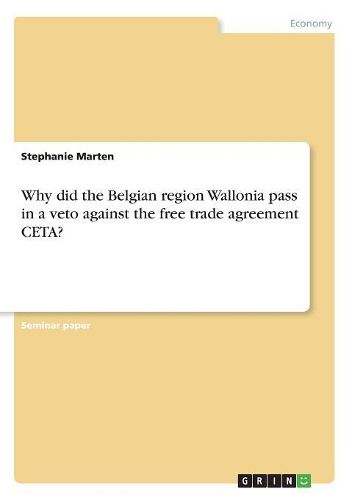Readings Newsletter
Become a Readings Member to make your shopping experience even easier.
Sign in or sign up for free!
You’re not far away from qualifying for FREE standard shipping within Australia
You’ve qualified for FREE standard shipping within Australia
The cart is loading…






Seminar paper from the year 2017 in the subject Economics - International Economic Relations, grade: 1,3, Ruhr-University of Bochum, language: English, abstract: A small region in Belgium caused the fear that seven years of negotiation have been done in vain. This event gives rise to many questions. Why was this small region able to veto in the first place? Is this veto justified? And why did the Belgian region Wallonia pass in a veto against the FTA CETA? To answer, especially, the last question, the reader will first be introduced to the political and historical context concerning this situation. With the higher involvement of untraditional trade actors in trade politics mentioned above, a liberal approach is the method most practical for the analysis. Because of the breadth of Andrew Moravcsik's Variants of Liberalism Approach, this theory will be used in the analysis. The conclusion introduces the aftermath of the negotiations, summarises the results and tries to find the answer to the research question.
$9.00 standard shipping within Australia
FREE standard shipping within Australia for orders over $100.00
Express & International shipping calculated at checkout
Seminar paper from the year 2017 in the subject Economics - International Economic Relations, grade: 1,3, Ruhr-University of Bochum, language: English, abstract: A small region in Belgium caused the fear that seven years of negotiation have been done in vain. This event gives rise to many questions. Why was this small region able to veto in the first place? Is this veto justified? And why did the Belgian region Wallonia pass in a veto against the FTA CETA? To answer, especially, the last question, the reader will first be introduced to the political and historical context concerning this situation. With the higher involvement of untraditional trade actors in trade politics mentioned above, a liberal approach is the method most practical for the analysis. Because of the breadth of Andrew Moravcsik's Variants of Liberalism Approach, this theory will be used in the analysis. The conclusion introduces the aftermath of the negotiations, summarises the results and tries to find the answer to the research question.